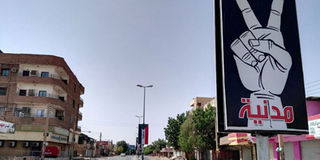Sudan repression aims to 'break' elite, says analyst

A picture taken on June 6, 2019 shows Street 60 nearly deserted in the capital Khartoum. Hanging placards read in Arabic "Civilian and Peaceful". AFP PHOTO
Sudan's paramilitary Rapid Support Forces (RSF) with its repression of the country's protest movement aims to "psychologically break" the educated elite, says Marc Lavergne of the French National Centre for Scientific Research (CNRS).
Why did violence erupt so suddenly?
"It's an operation that was prepared in advance and carefully planned. It's not gratuitous barbarity. The aim is to sow terror...
"The outburst of violence... aims to psychologically break the population of Khartoum because it's the nation's elite that is under attack.
"The people (demonstrating) in the streets all have an education, aspirations of democracy, of human rights, freedom.
"I don't think (ruling military council chief) Abdel Fattah al-Burhan" is behind the repression.
"I think it's more like Salah Gosh," Sudan's former intelligence chief.
Ties between army rulers and militias?
"There is an osmosis between the military and the population. Everyone has a cousin in the army...
"That's how I understand the about-face by Burhan: one day he says, 'We stop, we cut links,' and the next he comes back 'Let's resume negotiations without conditions.'
"The soldiers also have a lot of fear of the RSF roughnecks, of the soldiers of fortune who come from nowhere and know no limits.
"(The army's) career officers, they studied in military schools, they have a sense of hierarchy, of discipline, they are not on the same wavelength.
"The RSF does the dirty work that the army cannot or does not want to do."
Role of foreign players?
"Sudan is extremely strategic for China... It has a lot of possible resources which are not exploited. It's the Chinese who will take them...
"The Gulf countries' line is 'no democracy in Sudan' because that would mean 'a mess for us'.
"Their youth are starting to understand there are other models than that of an autocratic monarchy."
US President "Donald Trump fully sympathises with the soldiers, with the Saudis. But the Americans don't know Africa...
"France has its hands tied because the countries involved are big arms buyers. It depends on its foreign policy on the Emirates and Saudi Arabia."




